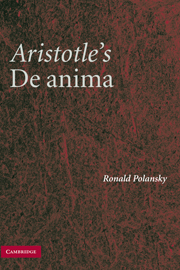Book contents
- Frontmatter
- Contents
- Preface
- List of Abbreviations
- Introduction
- COMMENTARY ON DE ANIMA: : Book 1
- 1 The Nobility and Difficulty of Study of Soul; Its Connection with Body
- 2 The Predecessors' Use of Soul to Account for Motion and Perception
- 3 Criticism of Predecessors' Way of Accounting for Motion
- 4 Criticism of the Harmonia View as an Account of Motion
- 5 Criticism of Predecessors' Way of Accounting for Cognition
- COMMENTARY ON DE ANIMA: Book 2
- COMMENTARY ON DE ANIMA: Book 3
- Bibliography
- Index
1 - The Nobility and Difficulty of Study of Soul; Its Connection with Body
Published online by Cambridge University Press: 18 December 2009
- Frontmatter
- Contents
- Preface
- List of Abbreviations
- Introduction
- COMMENTARY ON DE ANIMA: : Book 1
- 1 The Nobility and Difficulty of Study of Soul; Its Connection with Body
- 2 The Predecessors' Use of Soul to Account for Motion and Perception
- 3 Criticism of Predecessors' Way of Accounting for Motion
- 4 Criticism of the Harmonia View as an Account of Motion
- 5 Criticism of Predecessors' Way of Accounting for Cognition
- COMMENTARY ON DE ANIMA: Book 2
- COMMENTARY ON DE ANIMA: Book 3
- Bibliography
- Index
Summary
De anima i may be offputting because it jumps quickly into consideration of the difficulties of the investigation and because it reflects upon Aristotle's predecessors of long ago. It may help to view this first book, and even the whole De anima, as a variation upon Socratic dialogue. Aristotle's treatment of soul is calculated and contrived as the written Socratic dialogues, as befits a systematic investigation. Such dialogues as Plato's Charmides, Laches, Euthyphro, and Meno start with scene setting leading to the classic “What is X?” question. Aristotle's first chapter sets the scene by preliminary inquiry into the location of the investigation and its aim (402a1–7); these opening remarks lead to the central question of the work: what is the soul (a7–10)? In the Socratic dialogue the interlocutor's opening answer to the “What is X?” question may be of the wrong sort, and Socrates must argumentatively expound upon how to go about defining X. Comparably Aristotle's first chapter considers issues surrounding definition of the soul. In Socratic dialogue the interlocutor offers a series of accounts of X, accounts delineating all the really likely answers, that Socrates defeats through elenctic argument; Aristotle in the rest of book 1 restates the philosophical tradition's prominent answers to what the soul is and its basic features, and their reasons for supposing so. He takes these promising lines of previous thought, these plausible endoxa regarding soul, as interlocutors and refutes them.
- Type
- Chapter
- Information
- Aristotle's De AnimaA Critical Commentary, pp. 33 - 61Publisher: Cambridge University PressPrint publication year: 2007



